- Home
- Piers Anthony
Refugee Page 5
Refugee Read online
Page 5
That was all. We could not keep our toys and dolls and treasured books. Surface suits had very little room for extra things, even if we hadn’t needed the pittances the sale of those things brought. Spirit tried hard to conceal her tears, no longer quite so thrilled about the journey, and I went bleakly about the business of cashing in. We knew what was at stake.
I kept the laser pistol, however, squeezing it into an exterior pocket, and I knew Spirit kept her finger-whip.
As far as I know, no final payment was made on the mortgage. It was not that we sought to cheat Colonel Guillaume, who had done the best he could for us within the limits of his philosophy, but that the foreclosure already represented some profit for him, since we had built up a fair equity over the years which he would not have to transfer to the coffee-plantation residence. Perhaps he knew what we intended and did not report us to the authorities for that reason. As long as his hands were technically clean and he made a fair profit, he did not mind our effort to seek a better life elsewhere. Certainly he could have stopped us, had he wished to.
We left at night, in order to avoid any police watch. Again, it would not have been possible to escape the dome of Maraud if the authorities had really cared to prevent us. But we were only peasants; they were hardly concerned if we took it upon ourselves to depart the good life we supposedly had here.
I should explain that leaving a dome is no simple matter. Callisto is an airless world, terraformed only in particular spots. It is the same with all the moons of Jupiter, and indeed throughout the Solar System other than Earth. The domes are made of huge bubbles grown in the massive atmosphere of Jupiter, floated to the local surface by means of standard antigravity shields, cut in half, and cemented to surface plates. The fit had to be strong and tight, or the pressure of the air inside would blow the dome apart and right off Callisto. So entrance and egress were only by air locks, and these were not carelessly supervised.
The city-dome of Maraud is 1.3 kilometers in diameter, so that each of its 100,000 (approximately) inhabitants can have a floor space of at least ten square meters. Of course family units like ours increased their effective floor space by living in two-story homes. Anyway, there were only two locks big enough for vehicles, and only one of these functioned at night, so that part of our course was set.
Mother and the girls bundled down in the cargo cage, while I got to sit up front with my father. I know this is teenage foolishness, but it made me feel important, and I felt as if I were a real adventurer in the control cabin of a sleek Jupiter Navy spaceship, copiloting through the starry galaxy. Of course Navy ships do not cruise the galaxy; the relativistic limitation confines mankind largely to his own Solar System. Still, this was the way my imagination went. Imagination allows more leeway than does reality, which is perhaps why we come equipped with it. What a horror it would be to be forever restricted to reality!
“Special order of garbage,” my father called out to the technician in charge of the lock. That damped my fantasy somewhat; garbage is not exactly the stuff of high adventure. Still, this too was a kind of fantasy. At least I prefer that description to the alternative of calling my father a liar.
My father proffered a folded paper. The technician took the paper and glanced at it. It was a standard twenty-dollar bill, an obvious bribe. “The authorization seems to be in order,” the man agreed, pocketing it. “Get that garbage well away from here.” He pressed the buttons and the airlock panel slid clear.
The “garbage” of course was my mother and two sisters, hunched in the cage with our limited supplies. I wondered whether they appreciated the humor.
My father drove on. It was a pedal car, of course, as few motors operated conveniently in a vacuum and very little power was needed on the airless, low-gravity surface. Inside the dome the pollution of ordinary motors was unacceptable and distances were short, so the pedalers made sense there too. It occurred to me that the dome of Maraud was very like an ancient walled city, small and crowded but secure from the enemies without. In this case the enemies were vacuum and low gravity and terrible cold. This was also one reason that projectile weapons were not used inside the dome; the substance of the dome could reflect a laser beam fairly harmlessly, but a powerful enough projectile just might make a hole, and such a nightmare was not to be risked.
We secured our suits, which hung on us awkwardly, made sure the three in back were secure, and sealed our helmets. The lock panel slid closed behind us, the warning klaxon sounded, and the air pressure dropped. I had been outside the dome before, of course, on field trips in school, so I knew what to expect. But this time it was excitingly real, for we planned never to return. There was no hospital tank along to rescue us if we suffered a suit blowout, and no home for us to relax in if we turned back. They might not even open the lock for us. We were committed with an uncompromising finality that awed me in a somewhat squeamish manner.
Faith sat up suddenly in the cage, pointing to her left leg. That leg was not very shapely in the suit, but that was not the point. A thin plume of vapor jetted from a pinhole there. Hastily my mother slapped a seal patch on it, pressing it tightly in place. These were old, battered suits, which was why we had been able to afford them. Some problems were to be expected—but this served to remind, me, as if I needed reminder, that the danger was real and immediate. If any of us suffered a full-scale blowout, that person would be lost.
Our suits inflated and grew taut as the last of the air went, without any other problem. Fortunately there is not much actual force behind a pinhole leak, and an external patch can readily contain it. I gave a silent sigh of relief.
The outer panel on the lock slide open and we pedaled out onto the barren surface of Callisto. We were truly on our way!
The distaff contingent of our spaceship (as I fancied it) sat up and more or less joined us once we were clear of the lock. We could not readily talk with each other, for these primitive suits lacked radios, and of course there was no atmosphere to conduct our sound. But there was sound; it was conducted through the vehicle and our suits. We heard, as it were, through the seats of our pants. It wasn’t very clear, since there was also the rattling of the pedal car, but it was better than silence.
Spirit leaned forward over the top of the cage and touched her helmet to mine. “Isn’t this fun?” she cried, so loud that I jerked my head away. Head-to-head conduction was much more efficient! “Valhalla, here we come!” That last was through the seat, much dimmer.
Valhalla is the monstrous system of concentric rings associated with a huge old crater, extending out about fifteen hundred kilometers from its center—a significant fraction of the planet’s surface.
Maraud is about one hundred kilometers outside that formation, and the bootleg bubble was hidden in an old crater hangar about two hundred kilometers within it, so we had a good three hundred kilometers to go. We could travel up to forty or fifty kilos per hour in this trace gravity, however, so that was all right.
The city domes, you see, use gravity lenses to concentrate gravity inside them, bringing it up to Earth norm, what we simply call gee. This is actually another aspect of the gravity shielding used to make saucers float above ground and bubbles float between planets. There is no such thing as blocking out gravity, but it can be diluted or intensified in limited regions by the lens-like shields, somewhat the way light itself can be affected by a properly curved lens. That’s a considerable oversimplification; the actual science of gravity manipulation is far too complex for an amateur like me to comprehend. But I am sure that gravity variation is the key to the human colonization of the Solar System, because it makes both travel and residence feasible anywhere in space. Not easy, understand, but feasible, because of the enormous savings in energy required for these activities.
My mind reviewed what I had learned in school, for it was suddenly more relevant to my immediate existence. The human species had originated on the Planet Earth, but population had expanded voluminously until there really wasn’t room for
everyone. For reasons that weren’t entirely clear to me, this caused people to react violently, and they were afraid there would be a bad nuclear war that would destroy everything. But then the discovery of gravity shielding, popularly and not too accurately called antigravity or null-gee, had enabled the extra people to emigrate to the other planets and moons of the Solar System, and the threat of internecine war had faded for a while.
For a while—that is a significant qualification. According to my history texts, the crush of overpopulation on Earth and diminution of resources had been set back by some five or six hundred years. As it happens, those years have passed, and we are now back to the point, population/resourcewise, where we were just before the discovery of the technique of gravity manipulation. So we face the problem again—only this time grav-shielding isn’t enough to abate it. That makes me nervous, when I think about it.
The early colonization of the Solar System proceeded rapidly, for the shields enabled man to hoist huge masses into space. The problem of air and food and water remained, however, so there were limits. It was like man’s discovery of the lever: It enabled him to multiply his force, but not indefinitely. One enterprising company had fitted a gravity lens to an ocean liner and sailed it through the air. But it was clumsy outside its natural element, subject to errant winds, and when it sailed too high, the passengers suffered from the thinning of the air. Airplanes had similar problems, actually, as they flew beyond the normal atmosphere. Efficient as an airplane may be in air, it becomes clumsy in vacuum, for its wings cannot plane through nothing. So in the end the compact, simple, tough bubble became king of space. From the outside a bubble most resembled a planetoid with portholes, or a little round meteor with craterlets on it, but inside it was a temporary world.
Bubbles floated out to all the other planets and moons and fragments, carrying gravity lenses and construction equipment that could operate in a vacuum. Bases were established throughout the Solar System in the, course of the first century following the null-gee discovery. New nations sprang up in the likeness of old, as individual Earthly governments operated competitively to establish their domains in space. The American continents of Earth centered on the richest prize, the gross planet Jupiter and its moons, while the Asians settled for the next-greatest prize, beautiful Saturn, with its rings and many small moons. The smaller or more distant planets, considered less desirable, were left to the lesser powers of that day: the Africans, who got the hot inner worlds of Venus and Mercury; the Europeans, who got Uranus; the Moslem states, who got Neptune and its oil-rich satellite Triton, and the remainder somewhat haphazardly distributed among other special interests. A number of the other powers claimed shares of frigid Pluto and its satellite Charon, hoping eventually to discover and exploit rich resources there.
There was no established population on Charon or Pluto, however; they were just too far out, and the sunlight there was too dim to be usable for power.
This was part of the education I had suffered in school, which I now parrot back as if it represented original thinking on my part. Would it were so! I happen to have a flair for geography, so I did well, but most of my fellow students professed to find it boring. I could make fairly precise matchings of each planet or moon with an equivalent political entity of six hundred years before on Earth; no one else saw any point in such a game, and I can’t honestly claim it is more than idle entertainment.
Oops—did I write that the Moslems of Earth took Neptune? I would have flunked that question on an exam! Already my school learning fades and becomes confused. It was Mars the Moslems took; Neptune was—let me think now—that went to the Australians. Yes, now I have it straight.
I experienced queasiness that interrupted my chain of thought described above. I tend to think too much, as I may have confessed before. “Say, fun!” Spirit exclaimed brightly against my helmet. “We’re passing out of the lens!”
True enough. The lens concentrated gravity in Maraud to Earth normal, but outside the dome gravity thinned out, since this was the depressed area three or four times as broad as the dome. Gravity doesn’t come from nothing, after all. Now we were coming into the true natural surface attraction of Callisto, which was a little more than a quarter Earth norm. From one gee to one-tenth gee to one-quarter gee—it was vaguely like riding ocean waves. I have not had direct experience with any large body of water, but can imagine it. Maybe we were riding gravity waves.
The outer surface of Callisto is bleak, barren, and frankly, dull. Our world is the most heavily cratered significant body in the Solar System, for the past billion years of new meteoric strikes have only replaced old craters with new ones, not changing the total number. One might suppose this would make for a singularly variegated terrain, but that is not so. Right here on the surface it simply wasn’t that interesting. On other planets there may be deep oceans and high, jagged peaks; not so Callisto and our sister planet Ganymede. These are two ice-ball worlds, of low overall density because of the ice, and, though the surface is crusted with rock and dust, the thick mantle of ice below prevents any really spectacular mountains from forming.
I’m not sure I’m getting this across. You see, ice is as hard and stable as any other rock at the local temperature of 100 degrees Kelvin—I’m not as good at figures as geography, but that’s an easy one to remember, one hundred degrees Celsius above absolute zero—but at the local noon (which of course has no relation to the Earth time we use inside the domes), it can be fifty degrees warmer, and deep down below the pressure can heat it some too, so in the course of millions of years that ice does soften and flow a little. This planet has been around for four billion years or so, so the flow obliterates the extreme features. Result: shallow, rounded craters standing, as it were, shoulder to shoulder, rim to rim, and one inside another, and overlapping: This world is made of craters, and none of them are any effort to navigate. There are no cutting edges on Callisto. You might say the features of the surface have been eroded by water: not water coursing over from above, as on Earth, but slowly squeezing out from below. That’s why we were moving along so well in our wheeled vehicle; there was very little natural obstruction.
The sky was more interesting. This was night, on the surface as well as inside the dome, but Jupiter was full, and his baleful light flooded the rolling rills of Valhalla. Jupiter was anything but dull, with his violently contrasting bands of atmosphere and the various gaseous eyes staring at us. Surely Jove was watching our puny efforts with disdain—but he was our destination. I was, of course, sorry to leave my home world, for all my experience was invested here on Callisto and all my prior hopes for success had been defined by the Half-cal culture and hierarchy. But I knew that in those bands of turbulent color on the Jovian Planet was opportunity as vast as Jupiter himself. We would certainly be better off there; we would no longer be peasants, there.
I looked directly up, trying to see the other gravity lens, the one above us, close. Such lenses don’t just fix the gravity inside the domes, they govern the light we receive. This can be hard for people who don’t reside on moons to understand, so I’ll try to make it simple: Light is affected by gravity, technically the curvature of space that we call gravity, so a lens that bends gravity waves also bends light waves. Properly formed, a large gravity lens can be used to focus the light of the distant sun on a smaller area, making it proportionally more intense. There’s a lot of energy in light, as a magnifying glass can demonstrate when used to set fire to things. Since the sun’s light is much less intense out here at Jupiter’s orbit than it is at Earth’s orbit, we need to focus it to match what our bodies and our plants are used to. We are all transplants from Earth, really, though we may have been born or seeded here; a few centuries can’t erase a few billion years of evolution.
So above each dome-city is a huge gravity lens that is twenty-seven times the area of the dome, and the lens focuses the wan sunlight to that amount, and it shines in through the dome’s transparent roof to light and warm the city, exactly
as would be the case on Earth. Well, not exactly; Earth’s copious atmosphere filters out many deleterious aspects of the radiation, so our twenty-seven-times-concentrated sunlight would burn us if we took it straight. But the material of the dome is designed to filter out the harmful radiation, substituting for the missing depth of atmosphere, and so the net effect is similar.
The same is true for the agricultural domes; they are literally greenhouses. This is convenient to do on an airless planet, since nobody lives outside to complain about being deprived of sunlight. Naturally the focused brilliance at the dome is at the expense of the twenty-seven-times-as-large area around it, which receives very little light. We had not noticed any difference because we pedaled through this zone at night. But it would have been night by day also, near the dome, if you see what I mean.
It’s really more complicated than that, because Callisto’s day is the same as its period of revolution around Jupiter: sixteen and two-thirds Earth days. One face—Half-cal’s—always faces Jupiter; the other always faces space. So we have eight and a third days of continuous light, and then a night just as long. We humans don’t like that; it doesn’t match our biological rhythm. So we exchange light with a sister city around the globe: San Pedro, in the Dominant Republic. San Pedro is always in darkness when Maraud has light, and vice versa, so there’s always sunlight one place or the other. We never have clouds or bad weather, of course, the way Earth does; in fact, we have no weather at all. When Maraud is in sun, we use it for twelve hours, then refract it around the planet, in the form of a concentrated light beam, using a chain of vertical gravity lenses, to San Pedro.
In this manner we have our night in the middle of the Callistian day, while they have their day in the middle of their night. When they are light, they send us twelve-hour segments of daylight. This is the most fundamental and absolute system of cooperation between the two nations of our planet, and is inviolate. If Half-cal and the Dominant Republic went to war with each other—and sometimes, historically, it has come to that, for we are a bickering culture—neither would abrogate the light exchange. Without it, life as we know it would be virtually impossible on Callisto. We depend on the sun for almost all our energy, for we have no great deposits of oil or uranium and lack the technical and industrial base to establish a hydrogen-fusion power plant.

 Serial
Serial Question Quest
Question Quest Chthon
Chthon Dragon on a Pedestal
Dragon on a Pedestal E. S. P. Worm
E. S. P. Worm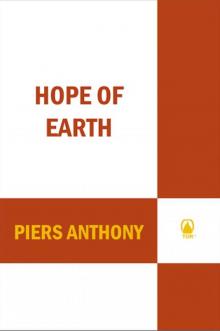 Hope of Earth
Hope of Earth The Series Boxed Set
The Series Boxed Set Blue Adept
Blue Adept The Sopaths
The Sopaths Beetle Juice
Beetle Juice Awares
Awares Golem in the Gears
Golem in the Gears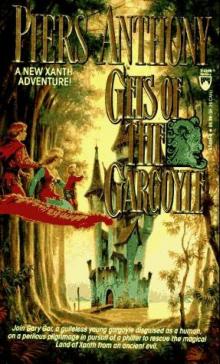 Geis of the Gargoyle
Geis of the Gargoyle Bamboo Bloodbath and Ninja's Revenge
Bamboo Bloodbath and Ninja's Revenge Heaven Cent
Heaven Cent Neq the Sword
Neq the Sword Pandora Park
Pandora Park Juxtaposition
Juxtaposition Bearing an Hourglass
Bearing an Hourglass Dragon Assassin
Dragon Assassin Board Stiff
Board Stiff Virtual Mode
Virtual Mode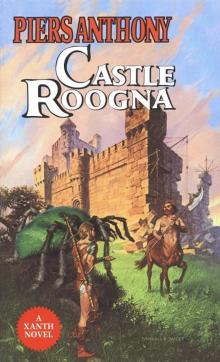 Castle Roogna
Castle Roogna Aliena Too
Aliena Too Pet Peeve
Pet Peeve The Metal Maiden Collection
The Metal Maiden Collection Volk
Volk Phaze Doubt
Phaze Doubt The Color of Her Panties
The Color of Her Panties Amazon Slaughter and Curse of the Ninja Piers Anthony
Amazon Slaughter and Curse of the Ninja Piers Anthony The Worm Returns
The Worm Returns Zombie Lover
Zombie Lover Xone of Contention
Xone of Contention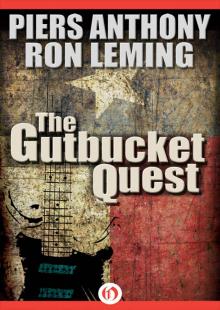 The Gutbucket Quest
The Gutbucket Quest Split Infinity
Split Infinity Dream a Little Dream: A Tale of Myth and Moonshine
Dream a Little Dream: A Tale of Myth and Moonshine Balook
Balook Out of Phaze
Out of Phaze The Secret of Spring
The Secret of Spring Mouvar's Magic
Mouvar's Magic Cube Route
Cube Route Mercenary
Mercenary Total Recall
Total Recall Man From Mundania
Man From Mundania The Magic Fart
The Magic Fart Letters to Jenny
Letters to Jenny Jack and the Giants
Jack and the Giants Executive
Executive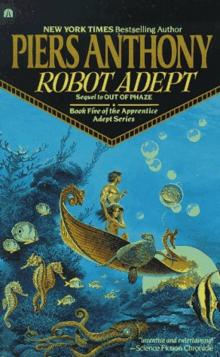 Robot Adept
Robot Adept On A Pale Horse
On A Pale Horse Vale of the Vole
Vale of the Vole Crewel Lye
Crewel Lye For Love of Evil
For Love of Evil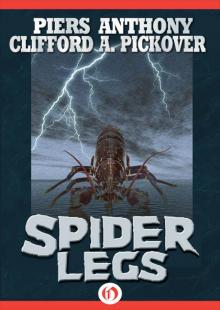 Spider Legs
Spider Legs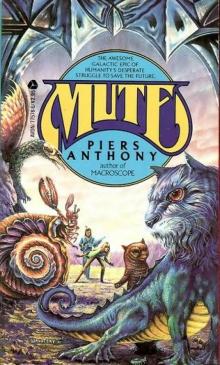 Mute
Mute Being a Green Mother
Being a Green Mother Hair Suite
Hair Suite Air Apparent
Air Apparent Politician
Politician Aliena
Aliena Phthor
Phthor Ghost Writer in the Sky
Ghost Writer in the Sky Pornucopia
Pornucopia Eroma
Eroma Shepherd
Shepherd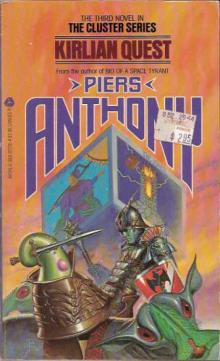 Kirlian Quest
Kirlian Quest Swell Foop
Swell Foop God of Tarot
God of Tarot If I Pay Thee Not in Gold
If I Pay Thee Not in Gold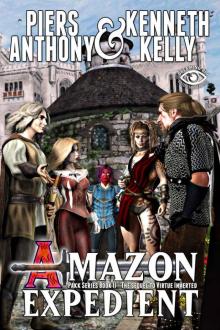 Amazon Expedient
Amazon Expedient Faun & Games
Faun & Games Vision of Tarot
Vision of Tarot Centaur Aisle
Centaur Aisle Serpent's Silver
Serpent's Silver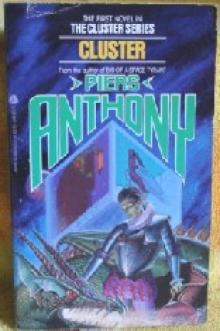 Cluster
Cluster With a Tangled Skein
With a Tangled Skein Chaining the Lady
Chaining the Lady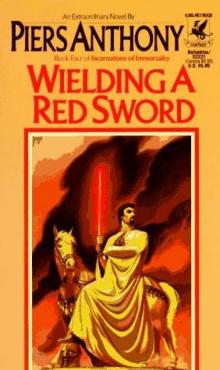 Wielding a Red Sword
Wielding a Red Sword Key to Chroma
Key to Chroma WereWoman
WereWoman Isis Orb
Isis Orb Hair Peace
Hair Peace Two to the Fifth
Two to the Fifth Viscous Circle
Viscous Circle Skeleton Key
Skeleton Key Cautionary Tales
Cautionary Tales The Source of Magic
The Source of Magic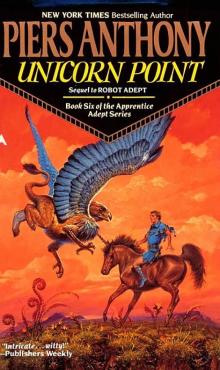 Unicorn Point
Unicorn Point Writer's Retweet
Writer's Retweet Demons Don't Dream
Demons Don't Dream Ogre, Ogre
Ogre, Ogre The Iron Maiden
The Iron Maiden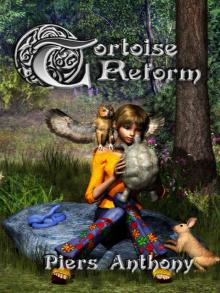 Tortoise Reform
Tortoise Reform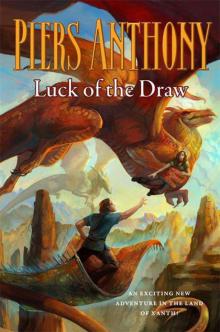 Luck of the Draw
Luck of the Draw A Spell for Chameleon
A Spell for Chameleon Yon Ill Wind
Yon Ill Wind Currant Events
Currant Events Var the Stick
Var the Stick And Eternity
And Eternity Kiai! & Mistress of Death
Kiai! & Mistress of Death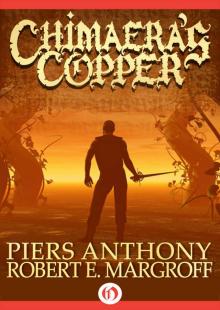 Chimaera's Copper
Chimaera's Copper Refugee
Refugee Isle of View
Isle of View Thousandstar
Thousandstar Mer-Cycle
Mer-Cycle Service Goat
Service Goat Five Portraits
Five Portraits Night Mare
Night Mare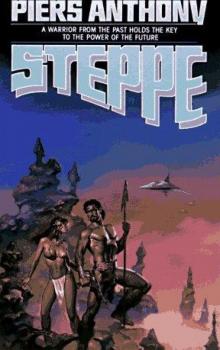 Steppe
Steppe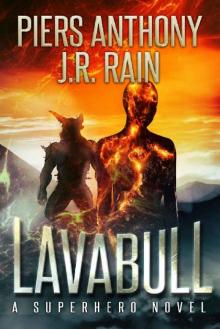 Lavabull
Lavabull Well-Tempered Clavicle
Well-Tempered Clavicle Aladdin Relighted
Aladdin Relighted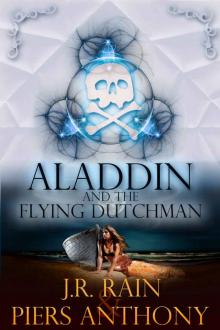 Aladdin and the Flying Dutchman
Aladdin and the Flying Dutchman Knot Gneiss
Knot Gneiss Roc and a Hard Place
Roc and a Hard Place Aladdin Sins Bad
Aladdin Sins Bad Flytrap
Flytrap Prostho Plus
Prostho Plus Esrever Doom
Esrever Doom Hair Power
Hair Power The Journey
The Journey Virtue Inverted
Virtue Inverted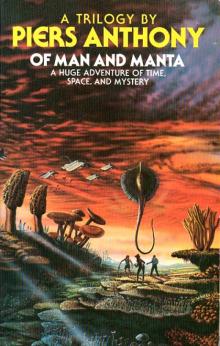 Of Man and Manta Omnibus
Of Man and Manta Omnibus Trail Mix: Amoeba
Trail Mix: Amoeba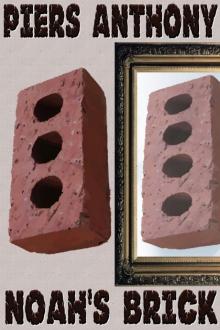 Noah's Brick
Noah's Brick Odd Exam
Odd Exam Magenta Salvation
Magenta Salvation Jest Right
Jest Right Fire Sail
Fire Sail Chthon a-1
Chthon a-1 Amoeba
Amoeba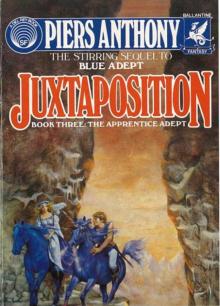 Juxtaposition aa-3
Juxtaposition aa-3 Pira
Pira THE CATERPILLARS QUESTION
THE CATERPILLARS QUESTION What Fears Become: An Anthology from The Horror Zine
What Fears Become: An Anthology from The Horror Zine Bio of a Space Tyrant Vol. 3. Politician
Bio of a Space Tyrant Vol. 3. Politician Ogre Ogre x-5
Ogre Ogre x-5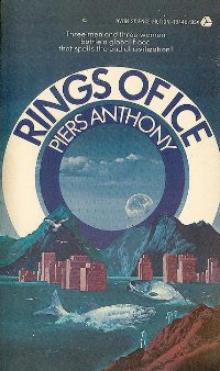 Rings of Ice
Rings of Ice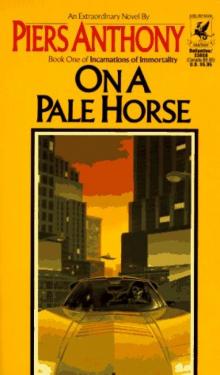 On a Pale Horse ioi-1
On a Pale Horse ioi-1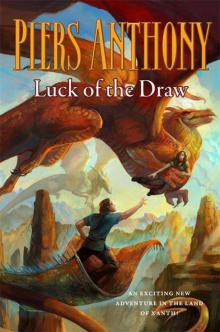 Luck of the Draw (Xanth)
Luck of the Draw (Xanth) Centaur Aisle x-4
Centaur Aisle x-4 Thousandstar (#4 of the Cluster series)
Thousandstar (#4 of the Cluster series)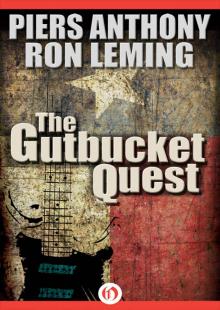 Gutbucket Quest
Gutbucket Quest Isle of Woman (Geodyssey)
Isle of Woman (Geodyssey) Chaining the Lady c-2
Chaining the Lady c-2 To Be a Woman
To Be a Woman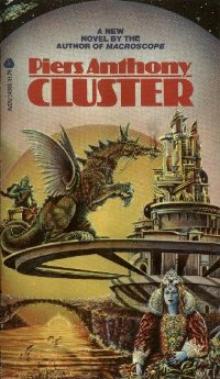 Cluster c-1
Cluster c-1 Battle Circle 2 - Var the Stick
Battle Circle 2 - Var the Stick Mercenary (Bio of a Space Tyrant Book 2)
Mercenary (Bio of a Space Tyrant Book 2) Battle Circle 1 - Sos the Rope
Battle Circle 1 - Sos the Rope Xanth 30 - Stork Naked
Xanth 30 - Stork Naked Secret of Spring
Secret of Spring Xanth 29 - Pet Peeve
Xanth 29 - Pet Peeve Serpents's Silver
Serpents's Silver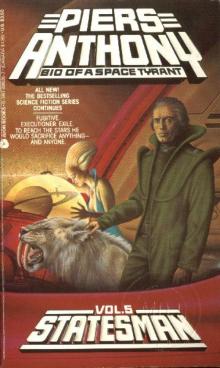 Statesman by Piers Anthony
Statesman by Piers Anthony Out of Phaze aa-4
Out of Phaze aa-4 Amazon Slaughter & Curse of the Ninja
Amazon Slaughter & Curse of the Ninja